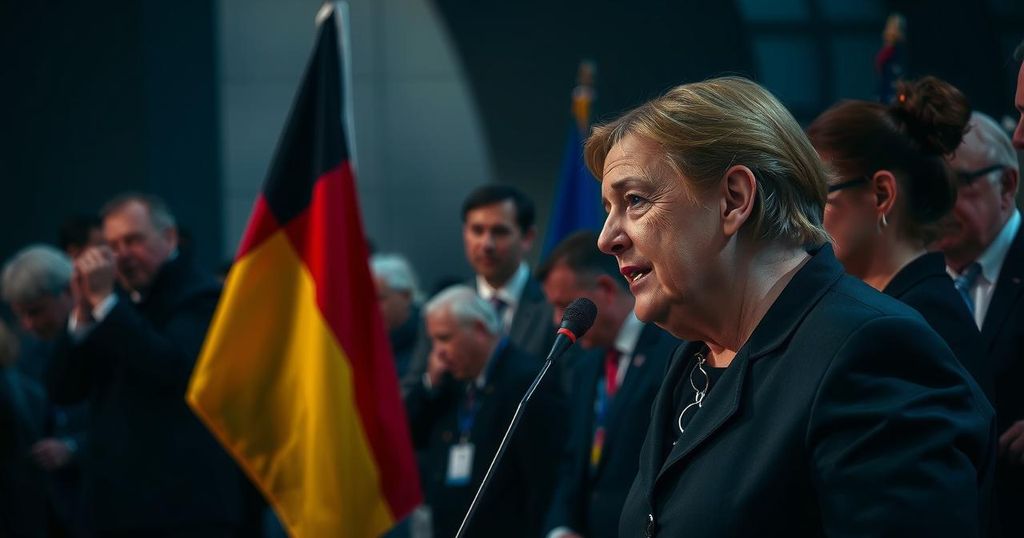Pressure Mounts on Scholz to Step Aside for Pistorius Before Election

Chancellor Olaf Scholz is facing pressure to step aside for Defence Minister Boris Pistorius as the SPD prepares for a snap election in February. Scholz’s declining popularity and recent party unrest have prompted calls for a leadership change amidst fears of electoral defeat. Pistorius, who is gaining support, may be seen as a stronger candidate against the CDU, which currently leads in the polls.
Germany’s Chancellor, Olaf Scholz, faces significant pressure to relinquish his candidacy in favor of Defence Minister Boris Pistorius, who currently enjoys greater popularity. The Social Democratic Party (SPD) plans urgent discussions regarding their candidate for the snap election on February 23, following a period of instability in Scholz’s coalition government that concluded with the dismissal of his finance minister. Despite Scholz’s intentions to pursue a second term, his political standing has dramatically declined, as evidenced by a recent poll placing him last among key political figures in Germany. The SPD, now trailing behind the centre-right Christian Democrats (CDU) in public support, is being urged by influential party members to consider a change in leadership. Former SPD leader Sigmar Gabriel expressed the urgent necessity for decisive political action, suggesting that continuing with Scholz could jeopardize the party’s electoral prospects. Current polling shows the CDU at 32% compared to the SPD’s 16%, emphasizing the critical need for a strategic pivot for the party. Scholz’s leadership has been marred by criticisms of his detached demeanor and ineffective communication with various stakeholders. Political analysts have noted that the SPD’s internal conflicts, particularly regarding support for Ukraine, complicate any potential transition to Pistorius, who is recognized for his more direct approach and favorable public reception. While he remains committed to his current responsibilities, Pistorius has hinted at the political fluidity of leadership roles, calling to mind examples from other political contexts where candidates have stepped back for perceived more viable successors. The dynamics within the SPD, especially fraught relations over Ukraine and economic strategies, might yet stymie Pistorius’s ascension despite growing calls for change. Scholz’s cautious stance on international military support starkly contrasts with Pistorius’s advocacy for stronger military aid for Ukraine, revealing underlying ideological divides that could inhibit any decisions made by party leadership as the election approaches.
The political landscape in Germany is highly dynamic, particularly as the country navigates significant economic challenges and growing public discontent, driven by high inflation and socio-economic divides. Chancellor Olaf Scholz has faced scrutiny regarding his leadership style and the effectiveness of his coalition government since its formation in 2021. With less than 100 days until the snap election, the SPD’s internal debates reflect broader anxieties about the party’s viability under Scholz’s continued leadership, while Defence Minister Boris Pistorius represents a potential lifeline amid declining support for the SPD among the electorate. Comparisons to Joe Biden’s electoral strategy highlight the frequent shifts in political strategies leading up to elections, emphasizing the importance of candidate popularity and public perception in electoral success.
In summary, Chancellor Olaf Scholz is under increasing scrutiny regarding his suitability as the SPD’s candidate for the upcoming February election, with many advocating for Defence Minister Boris Pistorius to take his place due to Pistorius’s favorable public image. The current polling positions the SPD significantly behind the CDU, and internal party discussions are intensifying as members seek a path forward in light of Scholz’s declining fortunes. The outcome of these deliberations will be critically important as the SPD grapples with both its leadership structure and broader political challenges.
Original Source: www.theguardian.com







